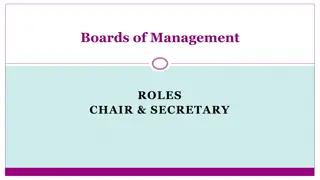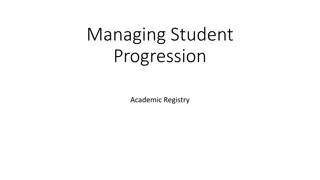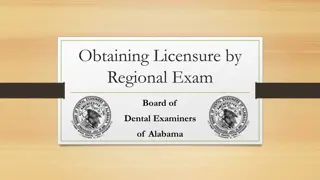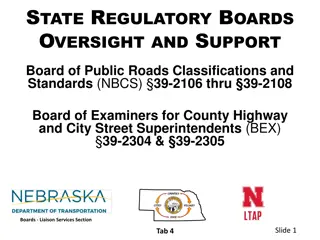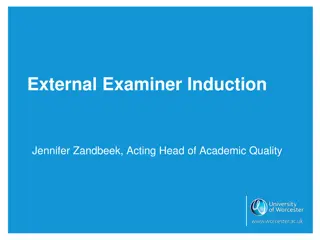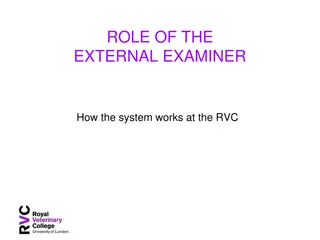Academic Assessment Boards and Examiners Overview
Academic assessment boards such as the University Progression & Award Board and Module Confirmation Board play a crucial role in confirming student outcomes and award decisions. External examiners are involved in evaluating student marks and ensuring adherence to regulations. The Quality Enhancement Board focuses on enhancing program performance and facilitating discussions on improvement areas. Assessment board calendars inform external examiners of key dates for involvement. Module Confirmation Boards analyze various assessment components to determine student marks. Chief external examiners participate in University Progression & Award Boards to review student marks profile.
Download Presentation

Please find below an Image/Link to download the presentation.
The content on the website is provided AS IS for your information and personal use only. It may not be sold, licensed, or shared on other websites without obtaining consent from the author. Download presentation by click this link. If you encounter any issues during the download, it is possible that the publisher has removed the file from their server.
E N D
Presentation Transcript
External Examiner Induction Assessment Boards
Assessment Boards a two tier system for confirmation of student outcomes Second Tier: First Tier: University Progression & Award Board (UPAB) Module Confirmation Board (MCB) Makes decisions on progression and award - Confirms module marks Considers the profile of marks for each student at progression points and those of completing students - Receives outcomes from Extenuating Circumstances Panel For proceeding students: Approves applied rules in relation to fails, malpractice, other special cases in accordance with the Regulations Ensure comparability of treatment for students in the interpretation of the Regulations
The Quality Enhancement Board(QEB) Does not confirm any student outcomes Operates in parallel to MCBs and UPABs A driver for quality enhancement Considers module and programme performance, data and trends A forum for discussion of good practice and areas of improvement Brings together Subject External Examiners and Course Teams Normally subject-based
Assessment Board Calendar All External Examiners will be notified of assessment board dates early in the academic year by the Assessment Team assessment@cumbria.ac.uk Subject External Examiners will be invited to Quality Enhancement Boards (QEBs) Chief External Examiners will be invited to University Progression & Award Boards (UPABs)
Module Confirmation Boards (MCBs) MCBs are attended by the Programme Leader and MCB Officer. The Subject External Examiner provides confirmation of external moderation through agreed processes before the Board. (Note: The University is planning to pilot an online approach in 22/23 The MCB considers mark sheets which include: The weighting of each item of assessment within the module For each student, the raw marks for each component of the total assessment, and the total module mark (calculated in accordance with the validated weighting scheme) The mean mark per cohort and the standard deviation demonstrating each of the component marks and how the overall mark has been arrived at In the case of courses containing a professional element, professional performance should be included For reassessment, both the initial and resit marks (both actual and capped marks)
University Progression & Award Boards (UPABs) [Reg F11.9 & Appendix 3f] Attended by Chief External Examiners (drawn from the pool of Subject EEs) The UPAB considers the profile of marks for each continuing and completing student. It ensures comparability of treatment for students in the interpretation and application of the Academic Regulations. For continuing students the UPAB: Confirms the results for each student in relation to progress through the programme Exercises compensation in accordance with the Regulations [Reg F14, F15] Resolves fails, deferred assessment, malpractice and other special cases
UPABs Contd For finalists the UPAB: Identifies the final award outcome [Regs H3 H7] Applies approved rules in relation to borderline cases and determines the final award Additional Notes: Undergraduate and Postgraduate programmes offer one reassessment opportunity, providing there is no conflict with a PSRB (thereafter, students may re-register to re-attend, if there has been engagement with the reassessment) An Assessment Contract will be required for any student with more than 40 credits in reassessment or where there has been confirmed malpractice
UPABs Contd Award classifications are calculated on the arithmetic mean of module marks achieved as follows: Honours Degree Level 4 marks are excluded Level 5 & 6 marks are weighted 30:70 The lowest 20 credits are discounted Where the mean percentage mark (MPM) is less than 2% below the next higher classification, and at least 100 credits are in the higher band, the student will be awarded the higher classification Top-Up Degree All marks contribute towards the MPM Where the MPM is less than 2% below the next higher classification, and at least 40 credits are in the higher band, the student will be awarded the higher classification
UPABs Contd Foundation Degree & Target DipHE Level 4 and 5 marks are weighted 30:70 Merit is awarded when the MPM is 59.5% or above Distinction is awarded when the MPM is 69.5% or above The lowest 20 credits is discounted Masters Degree All modules contribute towards the MPM Merit is award when the MPM is 59.5% or above Distinction is awarded when the MPM is 69.5% or above and the dissertation is not less than 65% Alternative Awards UPAB may award an alternative award and award title to students who have failed the target award, or leave at an interim progression point











